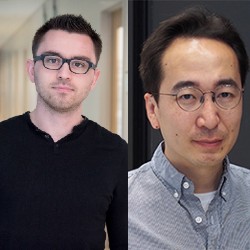TWO CSE PROFESSORS RECEIVE NSF CAREER AWARDS
UC San Diego Computer Science and Engineering (CSE) professors Deian Stefan and Sicun Gao have been awarded prestigious Faculty Early Career Development Program (CAREER) grants from the National Science Foundation to support their work to build secure computer systems and safer autonomous systems.

CAREER awards are the NSF’s most prestigious awards in support of early-career faculty who have the potential to serve as academic role models in research and education and to lead advances in the mission of their department or organization, according to the NSF.
“The recognition from NSF’s CAREER program shows the potential of our faculty’s research. I am pleased that Deian and Sean are among the distinguished CSE faculty members who have earned CAREER awards,” said CSE Department Chair Sorin Lerner.
Deian Stefan joined CSE in 2016. In his proposal for his project, “Principled and practical secure compilation using WebAssembly,” he writes about the challenges of building secure computer systems: “A single bug in the source code that programmers write or in the compilers they use to generate machine code could expose systems to attack.” Unfortunately, the gap between the theory of secure compilation and practice is huge. The goal of his project is to bridge this gap by extending the industrial WebAssembly byte code into a unifying principled and practical abstraction for secure compilation. The results of this work could make hundreds of millions of users safer: end-to-end security guarantees can prevent exploits in widely used systems, from web browsers to next generation cloud platforms.
Sicun Gao joined CSE in 2017. In his project “Correct-by-Learning Methods for Reliable Autonomy,” Gao will develop the theoretical foundations as well as practical techniques and tools for improving the reliability of realistic autonomous systems such as autonomous cars and unmanned aerial vehicles. Machine learning and data-driven approaches are now an indispensable part of the design of autonomous systems. The lack of formal assurance has become one of the key bottleneck that impedes the wider deployment and adoption of these systems. His project targets this challenge by developing formal synthesis and verification techniques for learning-based and data-driven control and planning methods for autonomous systems.
Written By: Katie E. Ismael
